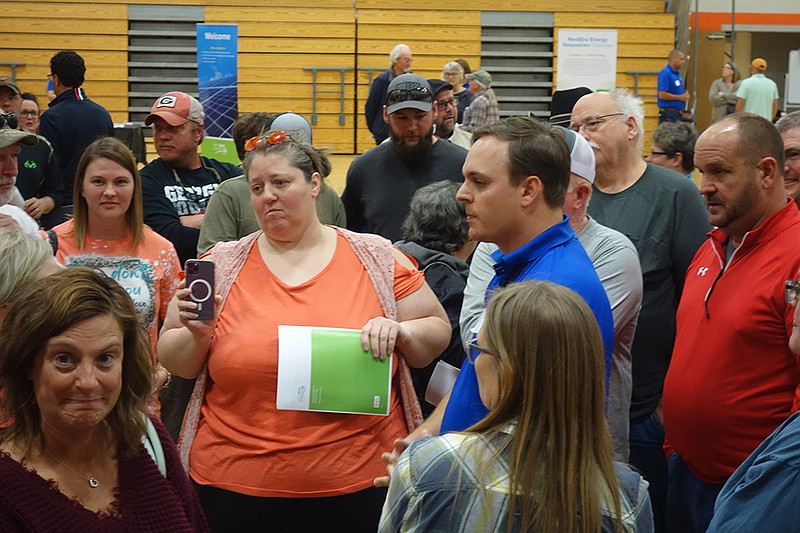NEW BLOOMFIELD — While not the format most Callaway County residents expected, they were given a chance to speak with representatives from a business looking to set up a solar power facility in New Bloomfield at an open house Tuesday.
NextEra Energy Resources has expressed interest in a solar power project that would span approximately 600 acres in Callaway County, mostly focused around the New Bloomfield area. The project is not a done deal and remains in the early stages, but many Callaway County residents — in particular around New Bloomfield — have concerns about the impact a solar power project could have on the area.
In general, NextEra is looking to lease land from property owners — mostly farmers — to install solar panels on. The panels would generate electricity to be sold to power suppliers in the area. It would generate an estimated 100 megawatts of energy.
At the earliest, the project could start in late 2024. The panels have an estimated lifespan of 25-30 years, although NextEra’s website says they can last up to 40 years with proper maintenance. At that point, NextEra could discuss with officials replacing the panels and continuing operations or shutting it down.
While some property owners have signed up to participate, the community isn’t completely on board with the project.
Susan Sexton, who is part of a group against the project that gathered petition signatures Tuesday, said her main concern is about the tax revenue for the New Bloomfield school district. She also wants to make sure the community’s voices are heard on the project.
Missouri exempts solar power systems from property taxes.
“This is a 30 year plan project where they can extend out project out further,” she said. “So, we’re talking 30, maybe even 40, years of no tax revenue for the school. What’s that tell our next generation? It tells them that it doesn’t matter, that these companies and all of this comes before education.”
Bo McGee, the NextEra Energy developer for the project, told residents Tuesday he’s also concerned about the area losing tax money because of Missouri law for solar power.
While nothing is finalized, McGee said he’s in conversations with county officials on three agreements focused on ensuring the area doesn’t lose anything and sees a benefit from the project. The agreements are not mutually exclusive and if the project goes through then multiple could be approved.
Since negotiations are ongoing, McGee couldn’t go into details on the agreements, but spoke generally on them.
One, he said, would be for NextEra to pay for road repairs from damage caused by the construction.
Another would have the company put funds into an account — held by a third party — to be used for removing the solar panels in the event something happens to the company. McGee said Callaway County officials would be able to access those funds.
The third agreement would have NextEra contributing to local funding through what McGee called a gift. What that amount might be is still in discussions.
While not actively negotiating contracts with school district, the city or the state, McGee said he’d be open to the conversations.
Area residents also brought up concerns about whether the volunteer fire district around New Bloomfield is properly equipped to respond if part of the solar facility caught fire. McGee said he’s hoping to have a conversation with the fire district as well.
Many attendees expected the open house to go more like an open forum where they could ask McGee and other NextEra employees questions about the project. However, it was set up for attendees to read information around the room with employees there to field questions.
McGee said he’s found that format to be more productive in the past because it meant more personal conversations could happen.
“In these formats, the opposition … will drown out those who are neutral and have questions about the project,” he said. “I will be yelled at for an hour. I could personally take that, but I don’t think that’s the best use of everybody’s time.”
McGee said there will be more public meetings as discussions continue. He also plans to continue meeting one-on-one with people, organizations and officials on the topic.

